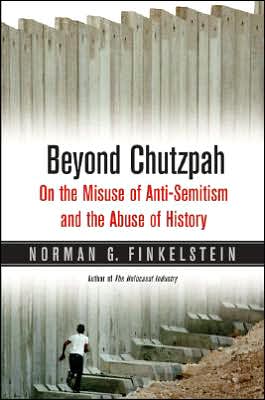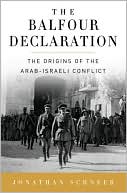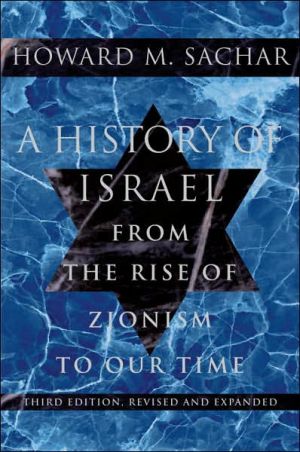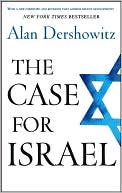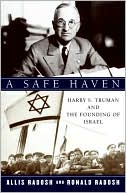Beyond Chutzpah: On the Misuse of Anti-Semitism and the Abuse of History
Meticulously researched and tightly argued, Beyond Chutzpah points to a consensus among historians and human rights organizations on the factual record of the Israel-Palestine conflict. Norman G. Finkelstein exposes the corruption of scholarship and the contrivance of controversy shrouding human rights abuses, and interrogates the new anti-Semitism. This paperback edition adds a preface analyzing recent developments in the conflict, and a new afterword on Israel's construction of a wall in...
Search in google:
"A very solid, important, and highly informative book. Norman Finkelstein provides extensive details and analysis, with considerable historical depth and expert research, of a very wide range of issues concerning Israel, the Palestinians, and the U.S."—Noam Chomsky, author of Hegemony or Survival "The most comprehensive, systematic, and well-documented work of its kind. It is one of the harshest—rational and nonemotional—texts about the daily practices of the occupation and colonization of the Palestinian territories by Israel, and it is an excellent demonstration of how and why the blind defenders of Israel, by basing their arguments on false facts and figures, actually bring more damage than gains to their cause."—Baruch Kimmerling, George S. Wise Professor of Sociology, Hebrew University of Jerusalem "A brave and daring challenge, meticulously researched. Must reading for anyone committed to a just and enduring peace in the Middle East."—Amy Goodman, host of Democracy Now!"Beyond Chutzpah is a brilliantly illuminating study of the lengths to which some American Jews will go to present Israel in a favorable light. On display are all the sterling qualities for which Finkelstein has become famous: erudition, originality, spark, meticulous attention to detail, intellectual integrity, courage, and formidable forensic skills."—Avi Shlaim, Professor of International Relations, Oxford University"The scholarship is simply superb. Finkelstein has clearly done his homework, and consulted and mastered a breathtaking range of material: primary sources and documents, scholarly works, reports old and new, correspondence with relevant individuals, and numerous other sources too. He has left no stone unturned."—Mouin Rabbani, Contributing Editor, Middle East Report
Beyond Chutzpah\ On the Misuse of Anti-Semitism & the Abuse of History \ \ By Norman G. Finkelstein \ University of California Press\ Copyright © 2007 Norman G. Finkelstein\ All right reserved.\ ISBN: 9780520249899 \ \ \ \ Introduction\ IN THE COURSE of writing this book, I passed a small milestone in my life. Twenty years ago, while researching my doctoral dissertation on the theory of Zionism, I came across a newly published book on the Israel-Palestine conflict: From Time Immemorial: The Origins of the Arab-Jewish Conflict over Palestine by Joan Peters. Promising to revolutionize our understanding of the conflict, the book was adorned on the back cover with glowing praise from the Who's Who of American Arts and Letters (Saul Bellow, Elie Wiesel, Barbara Tuchman, Lucy Dawidowicz, and others), and it went on to garner scores of reviews in the mainstream media ranging from ecstasy to awe. Its first edition, eventually going into seven hardback printings, became a national best seller. The central thesis of Peters's book, apparently supported by nearly two thousand notes and a recondite demographic study, was that Palestine had been virtually empty on the eve of Zionist colonization and that, after Jews made the deserted parts of Palestine they settled bloom, Arabs from neighboring states and other parts of Palestine migrated to the Jewish areas and pretendedto be indigenous. Here was the, as it were, scientific proof that Golda Meir had been right after all: there was no such thing as Palestinians. \ As it happened, From Time Immemorial was a colossal hoax. Cited sources were mangled, key numbers in the demographic study falsified, and large swaths plagiarized from Zionist propaganda tracts. Documenting the hoax and the rather more onerous challenge of publicizing these findings in the media proved to be a turning point for me. From then on, much of my life has, in one fashion or another, centered on the Israel-Palestine conflict.\ Looking back after two decades of study and reflection, I am struck most by how uncomplicated the Israel-Palestine conflict is. There is no longer much contention among scholars on the historical record, at any rate for the foundational period from the first Zionist settlements in the late nineteenth century to the creation of Israel in 1948. This wasn't always the case. For a long time two acutely divergent narratives on the Israel-Palestine conflict coexisted. On the one hand, there was the mainstream, or what one might call, with considerable accuracy, the Exodus version of the past-basically the heroic, official Zionist tale immortalized in Leon Uris's best-selling historical novel. On the other hand, beyond the margins of respectable opinion, a small dissenting body of literature challenged prevailing wisdom. To take one indicative example, the mainstream Israeli account maintained that Palestinians became refugees in 1948 because Arab radio broadcasts had instructed them to flee. Yet already by the early 1960s, Palestinian scholar Walid Khalidi and Irish scholar Erskine Childers, after examining the archive of Arab radio broadcasts from the 1948 war, concluded that no such official Arab exhortations had been given. But revelations such as these had little or no impact on mainstream opinion. Beginning in the late 1980s, however, a steady stream of scholarly studies, mostly by Israelis, dispelled much of the Zionist mythology enveloping the origins of the conflict. Thus, it was now conceded by all serious scholars that the "Arab radio broadcasts" were a Zionist fabrication and that the Palestinians had been ethnically cleansed in 1948, and scholarly debate now focused on the much narrower, if still highly pertinent, question of whether this cleansing was the intentional consequence of Zionist policy or the unintentional by-product of war. Ultimately, on this and related issues, the dissenting narrative, proving closer to the truth, displaced the official Zionist one while, after heated polemics, a broad scholarly consensus on the historical record crystallized.\ A similar process of displacement and simplification occurred, coincidentally at just about the same time, on human rights questions. Up until the late 1980s, two fundamentally conflicting claims were put forth regarding Israel's human rights record in the Occupied Territories. The official Israeli contention, echoed by mainstream media, was that Palestinians in the West Bank and Gaza benefited from the most "liberal" and "benign" of occupations. However, a handful of dissidents, mostly Israeli and Palestinian human rights activists like Israel Shahak, Felicia Langer, Lea Tsemel, and Raja Shehadeh, charged, for example, that Israel systematically ill treated and tortured Palestinian detainees. Only a small number of independent human rights organizations existed back then, and these few either whitewashed or maintained a discreet silence on Israel's egregious human rights violations. It was notable-indeed, a scandal of sorts-that Israel's torture of Palestinian detainees first became known to a wider public (if still largely ignored), not on account of a human rights organization like Amnesty International but due to an investigative study published by the London Sunday Times. At the end of the 1980s, as I said, things started changing. Israel's brutal repression of the largely nonviolent first intifada, which erupted in late 1987, proved impossible to conceal or ignore, while new human rights organizations, both local Israeli and Palestinian as well as international, started springing up, and older, established ones stiffened resistance to external pressures.\ In the course of preparing the chapters of this book devoted to Israel's human rights record in the Occupied Territories, I went through literally thousands of pages of human rights reports, published by multiple, fiercely independent, and highly professional organizations-Amnesty International, Human Rights Watch, B'Tselem (Israeli Information Center for Human Rights in the Occupied Territories), Public Committee Against Torture in Israel, Physicians for Human Rights-Israel-each fielding its own autonomous staff of monitors and investigators. Except on one minor matter, I didn't come across a single point of law or fact on which these human rights organizations differed. In the case of Israel's human rights record, one can speak today not just of a broad consensus-as on historical questions-but of an unqualified consensus. All these organizations agreed, for example, that Palestinian detainees have been systematically ill treated and tortured, the total number now probably reaching the tens of thousands.\ Yet if, as I've suggested, broad agreement has been reached on the factual record, an obvious anomaly arises: what accounts for the impassioned controversy that still swirls around the Israel-Palestine conflict? To my mind, explaining this apparent paradox requires, first of all, that a fundamental distinction be made between those controversies that are real and those that are contrived. To illustrate real differences of opinion, let us consider again the Palestinian refugee question. It is possible for interested parties to agree on the facts yet come to diametrically opposed moral, legal, and political conclusions. Thus, as already mentioned, the scholarly consensus is that Palestinians were ethnically cleansed in 1948. Israel's leading historian on the topic, Benny Morris, although having done more than anyone else to clarify exactly what happened, nonetheless concludes that, morally, it was a good thing-just as, in his view, the "annihilation" of Native Americans was a good thing-that, legally, Palestinians have no right to return to their homes, and that, politically, Israel's big error in 1948 was that it hadn't "carried out a large expulsion and cleansed the whole country-the whole Land of Israel, as far as the Jordan" of Palestinians. However repellent morally, these clearly can't be called false conclusions. Returning to the universe inhabited by normal human beings, it's possible for people to concur on the facts as well as on their moral and legal implications yet still reach divergent political conclusions. Noam Chomsky agrees that, factually, Palestinians were expelled; that, morally, this was a major crime; and that, legally, Palestinians have a right of return. Yet, politically, he concludes that implementation of this right is infeasible and pressing it inexpedient, indeed, that dangling this (in his view) illusory hope before Palestinian refugees is deeply immoral. There are those, contrariwise, who maintain that a moral and legal right is meaningless unless it can be exercised and that implementing the right of return is a practical possibility. For our purposes, the point is not who's right and who's wrong but that, even among honest and decent people, there can be real and legitimate differences of political judgment.\ This having been said, however, it bears emphasis that-at any rate, among those sharing ordinary moral values-the range of political disagreement is quite narrow, while the range of agreement quite broad. For the past quarter century, the international community has held to a consensus on how, basically, to resolve the Israel-Palestine conflict: a two-state settlement based on full Israeli withdrawal from the West Bank and Gaza and full recognition of Israel within its pre-June 1967 borders. Apart from the United States, Israel, and, usually, this or that South Pacific atoll, the United Nations General Assembly, in a rare and consistent display of near unanimity, annually reaffirms this formula. A 1989 General Assembly resolution, Question of Palestine, effectively calling for a two-state settlement and "[t]he withdrawal of Israel from the Palestinian territory occupied since 1967" passed 151 to 3, the only dissenting vote apart from those of the United States and Israel being cast by the island state of Dominica. Fifteen years later and notwithstanding sweeping geopolitical changes-an entire social system disappeared in the interim while many new states were born-the consensus continued to hold. A 2004 General Assembly resolution, Peaceful Settlement of the Question of Palestine, that stresses "the necessity for a commitment to the vision of the two-State solution" and "the withdrawal of Israel from the Palestinian territory occupied since 1967" passed 160 to 6, the dissenting votes apart from the United States' and Israel's being cast by Micronesia, the Marshall Islands, Palau, and Uganda. Were debate to focus solely on real areas of disagreement, the conflict could probably be resolved expeditiously-if not to the liking of Israeli and American elites.\ Most of the controversy surrounding the Israel-Palestine conflict is, in my view, contrived. The purpose of contriving such controversy is transparently political: to deflect attention from, or distort, the actual documentary record. One can speak of, basically, three sources of artificial disagreement: (1) mystification of the conflict's roots, (2) invocation of anti-Semitism and The Holocaust, and (3) on a different plane, the vast proliferation of sheer fraud on the subject. In this introduction I will briefly discuss each of these in turn. The bulk of this study focuses on the second and third points.\ The Israel-Palestine conflict is often said to pose questions of such unique profundity or complexity as to defy conventional analysis or resolution. It's been variously cast as a cosmic clash of religions, cultures, civilizations. Even normally sober observers like Israeli writer Meron Benvenisti used to contend that its essence was a "primordial, irreconcilable, endemic shepherd's war." In fact, such formulations obfuscate rather than illuminate. No doubt, the conflict raises thorny theoretical and practical problems, but not more so than most other ones. It is also perfectly amenable to comparative analysis, bearing in mind, as always, the limits to any historical analogy. The obvious reason Israel's apologists shun such comparisons and harp on the sui generis character of the Israel-Palestine conflict is that, in any of the roughly comparable cases-the Euro-American conquest of North America, the apartheid regime in South Africa-Israel comes out on the "wrong" side in the analogy.\ Serious analysis of the Israel-Palestine conflict rarely makes resort to ponderous explanations, if for no other reason than because its origins are so straightforward. In 1936 a British royal commission chaired by Lord Peel was charged with ascertaining the causes of the Palestine conflict and the means for resolving it. Regarding the aspirations of Palestinian Arabs, its final report stated that "[t]he overriding desire of the Arab leaders ... was ... national independence" and that "[i]t was only to be expected that Palestinian Arabs should ... envy and seek to emulate their successful fellow-nationalists in those countries just across their northern and southern borders." The British attributed Arab anti-Jewish animus to the fact that the Jewish claim over Palestine would deny Arabs an independent Arab state, and to Arab fear of being subjugated in an eventual Jewish state. It concluded that there was "no doubt" the "underlying causes" of Arab-Jewish hostilities were "first the desire of the Arabs for national independence; secondly their antagonism to the establishment of the Jewish National Home in Palestine, quickened by their fear of Jewish domination." Eschewing airy formulations like Benvenisti's "primordial, irreconcilable, endemic shepherd's war" and, again, pointing up the manifest sources of the turmoil in Palestine, the commission wrote:\ Nor is the conflict in its essence an interracial conflict, arising from any old instinctive antipathy of Arabs towards Jews. There was little or no friction ... between Arab and Jew in the rest of the Arab world until the strife in Palestine engendered it. And there has been precisely the same political trouble in Iraq, Syria and Egypt-agitation, rebellion and bloodshed-where there are no "National Homes." Quite obviously, then, the problem of Palestine is political. It is, as elsewhere, the problem of insurgent nationalism. The only difference is that in Palestine Arab nationalism is inextricably interwoven with antagonism to the Jews. And the reasons for that, it is worth repeating, are equally obvious. In the first place, the establishment of the National Home [for Jews] involved at the outset a blank negation of the rights implied in the principle of national self-government. Secondly, it soon proved to be not merely an obstacle to the development of national self-government, but apparently the only serious obstacle. Thirdly, as the Home has grown, the fear has grown with it that, if and when self-government is conceded, it may not be national in the Arab sense, but government by a Jewish majority. That is why it is difficult to be an Arab patriot and not to hate the Jews.\ The injustice inflicted on Palestinians by Zionism was manifest and, except on racist grounds, unanswerable: their right to self-determination, and perhaps even to their homeland, was being denied. Several sorts of justification were supplied for the Zionist enterprise as against the rights of the indigenous population, none of which, however, withstood even cursory scrutiny. Belief in the cluster of justifications put forth by the Zionist movement presumed acceptance of very specific Zionist ideological tenets regarding Jewish "historical rights" to Palestine and Jewish "homelessness." For example, the "historical rights" claim was based on Jews having originated in Palestine and resided there two thousand years ago. Such a claim was neither historical nor based on any accepted notion of right. It was not historical inasmuch as it voided the two millennia of non-Jewish settlement in Palestine and the two millennia of Jewish settlement outside it. It was not a right except in mystical, Romantic nationalist ideologies, implementation of which would wreak-and have wreaked-havoc. Reminding fellow Zionists that Jewry's "historical right" to Palestine was a "metaphysical rather than a political category" and that, springing as it did from "the very inner depths of Judaism," this "category ... is binding on us rather than on the Arabs," even the Zionist writer Ernst Simon was emphatic that it did not confer on Jews any right to Palestine without the consent of the Arabs.\ \ \ Continues...\ \ \ \ Excerpted from Beyond Chutzpah by Norman G. Finkelstein Copyright © 2007 by Norman G. Finkelstein. Excerpted by permission.\ All rights reserved. No part of this excerpt may be reproduced or reprinted without permission in writing from the publisher.\ Excerpts are provided by Dial-A-Book Inc. solely for the personal use of visitors to this web site. \ \
1From Jesus Christ superstar to The passion of the Christ212Israel : the "Jew among nations"323Crying wolf664Impurity of arms965Three in the back of the head1316Israel's Abu Ghraib1427Return of the vandals1688Blight unto the nations1909High court takes the low road207App. IOf crimes and misdemeanorsApp. IIHistory of the Israel-Palestine conflictApp. IIIPeace process
